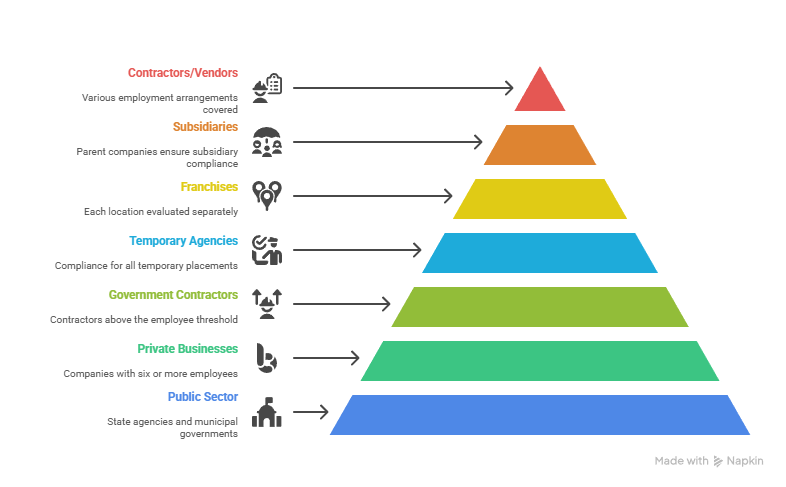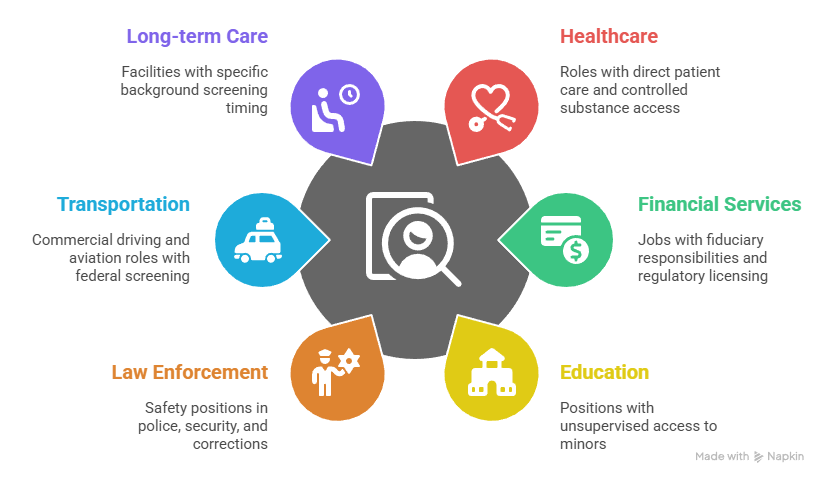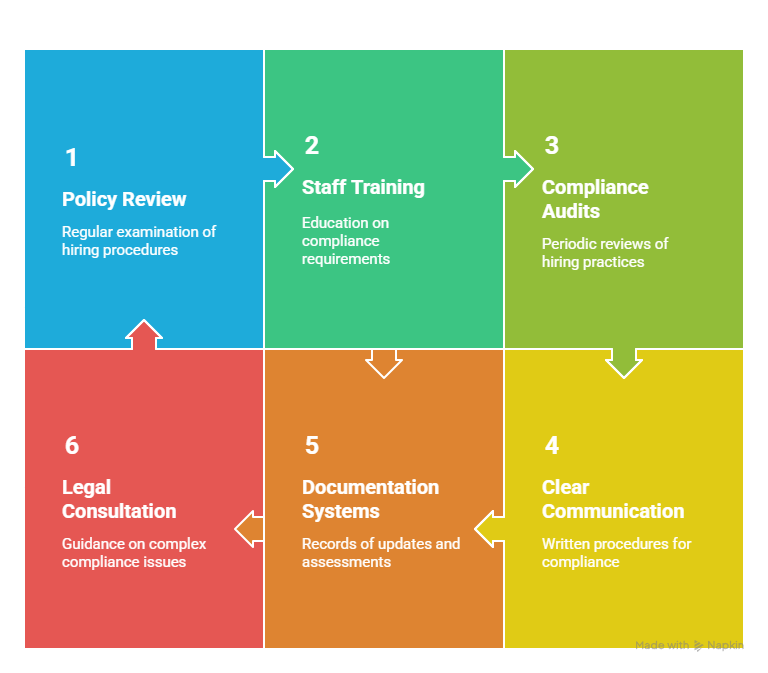Massachusetts ban the box legislation creates fair chance hiring opportunities by restricting when employers can ask about criminal history. This comprehensive law protects job seekers while establishing clear compliance requirements for employers across the Commonwealth.
Key Takeaways
- Massachusetts fair chance hiring laws prohibit criminal history questions on initial job applications for most positions
- The Fair Chance Act applies to employers with six or more employees in both public and private sectors
- Employers must wait until after a conditional job offer or first interview before conducting background checks
- Certain safety-sensitive positions may be exempt from ban the box laws in Massachusetts requirements
- Non-compliance can result in fines up to $500 per violation and potential civil lawsuits from job applicants
- Job seekers gain enhanced privacy protections and expanded opportunities to demonstrate qualifications first
What Is Massachusetts Ban the Box Legislation
Massachusetts implemented comprehensive fair chance hiring reforms through the Fair Chance Act in recent years. This legislation fundamentally changed how employers approach criminal background screening processes. The law reflects growing recognition that criminal history questions create unnecessary barriers for qualified candidates.
Ban the box laws in Massachusetts differ significantly from other states' approaches. The legislation establishes specific timing requirements for background checks. It also provides detailed guidance on permissible inquiries during hiring processes.
The Massachusetts approach balances second-chance opportunities with legitimate business concerns. Employers must restructure their hiring processes to comply with these new regulations. They must maintain workplace safety and security standards while following fair chance requirements.
This law positions Massachusetts among the most progressive states regarding criminal justice reform. The legislation affects millions of job seekers with criminal records across the Commonwealth. It also impacts thousands of employers who must update their hiring practices.
Which Employers Must Follow Massachusetts Fair Chance Laws
Covered Employers and Business Types
Ban the box compliance in Massachusetts applies to employers with six or more employees. This threshold includes both full-time and part-time workers in the calculation. The count is based on average employment over the preceding twelve months.
Massachusetts fair chance hiring requirements cover various employer types and business arrangements:

- Public sector employers: State agencies, municipal governments, and school districts regardless of size
- Private businesses: Companies with six or more employees calculated over twelve months
- Government contractors: All contractors above the employee threshold must follow requirements
- Temporary staffing agencies: Must comply with fair chance hiring for all placements
- Franchises and multi-location businesses: Each Massachusetts location evaluated separately for compliance
- Subsidiary organizations: Parent companies must ensure all subsidiaries follow practices
- Contractors and vendors: Various employment arrangements beyond traditional employees covered
Religious organizations may qualify for limited exemptions under certain circumstances. Most private businesses must comply with ban the box requirements regardless of industry type.
Industries and Positions With Exemptions
Certain positions remain exempt from Massachusetts background check restrictions due to safety concerns. These exemptions allow employers to conduct criminal background checks earlier in hiring. The exemptions are narrowly defined and job-specific.
Key exempt industries and positions include:

- Healthcare: Direct patient care roles and positions with controlled substance access
- Financial services: Jobs requiring bonding, fiduciary responsibilities, or regulatory licensing
- Education: Positions involving unsupervised access to minors in schools and childcare
- Law enforcement: Police, security, corrections, and related safety positions
- Transportation: Commercial driving and aviation positions with federal screening requirements
- Long-term care: Facilities with specific background screening timing requirements
These exemptions reflect legitimate safety concerns and regulatory requirements. Employers must still follow proper procedures even for exempt positions.
Timeline Requirements for Criminal History Inquiries
Massachusetts second chance employment laws establish strict timing rules for criminal history questions. Employers cannot ask about criminal background on job applications. They also cannot inquire during initial screening phases of the hiring process.
The earliest permissible timing occurs after specific hiring milestones are reached. Employers may ask after extending a conditional job offer. They may also inquire after completing the first interview with a candidate.
This delayed inquiry approach allows candidates to showcase their qualifications first. Job seekers can demonstrate their skills and experience before criminal history enters consideration. The process protects applicant privacy while ensuring employers get necessary information.
Employers must clearly communicate job requirements before requesting background information. They should outline essential functions and qualifications during initial interactions. This transparency helps candidates understand position expectations and requirements.
The implementation timeline varies based on employer size and type. Larger organizations faced stricter compliance deadlines during the law's rollout. Public sector employers had earlier implementation requirements compared to private businesses.
Ongoing compliance requires regular policy reviews and updates. Staff training must be updated as regulations evolve. Employers should monitor legal changes that might affect their hiring practices.
Permissible Criminal Background Check Practices
Approved Background Screening Methods
Once appropriate hiring stages are reached, employers may conduct comprehensive criminal background checks. Massachusetts fair hiring practices require using Consumer Reporting Agencies that comply with FCRA standards. Background checks must focus on convictions rather than arrests without dispositions.
Employers must provide clear disclosures about background check intentions before screening. Written authorization must be obtained from candidates before initiating any checks. The authorization should specify the types of background information being requested.
| Background Check Type | Permissible Timing | Required Disclosures |
| Criminal Convictions | After conditional offer/first interview | FCRA notice and authorization |
| Sex Offender Registry | After conditional offer/first interview | Separate authorization needed |
Sex offender registry searches require separate authorization and disclosure. Court records searches must include dispute process information. Employers should clearly explain how background results will be used in employment decisions.
The background check process must comply with both state and federal regulations. FCRA requirements apply to all employment-related consumer reports. Massachusetts-specific requirements add additional layers of protection for job seekers.
Prohibited Screening Practices
Certain background screening practices are specifically prohibited under Massachusetts law. Employers cannot ask about criminal history on initial job applications. They cannot require disclosure during preliminary screening processes.
Blanket policies excluding all individuals with criminal records are prohibited. Employers must conduct individualized assessments of criminal history information. They cannot use automatic disqualification based solely on criminal record existence.
Inquiries about arrests without convictions are generally prohibited. Questions about sealed or expunged records cannot be asked. Employers must focus on conviction records that are publicly available.
Social media screening for criminal history information before appropriate timing is prohibited. Informal background checks through personal networks violate fair chance requirements. All criminal history inquiries must follow proper authorization and disclosure procedures.
Individual Assessment Requirements Under Massachusetts Law
Ban the box laws in Massachusetts mandate individualized assessment of criminal history rather than blanket exclusions. Employers must evaluate the relationship between criminal convictions and specific job responsibilities. This case-by-case analysis prevents automatic disqualification based on criminal records alone.
The individual assessment process requires employers to consider multiple factors. Job-relatedness examines the direct connection between criminal offenses and position responsibilities. Time elapsed considers the period between conviction date and employment application.
Rehabilitation efforts must be evaluated during individual assessments. This includes education, training, employment history since conviction. Community involvement and volunteer work should also be considered in the evaluation.
Offense severity plays a role in individual assessment decisions. Misdemeanor versus felony classifications affect potential workplace impact. The nature of the offense must relate directly to job duties and responsibilities.
Documentation of individual assessment decisions helps demonstrate compliance with fair chance requirements. Employers should maintain records of their evaluation process and reasoning. This documentation helps defend employment choices if challenged legally.
The assessment must be conducted in good faith with genuine consideration of all factors. Employers cannot use individual assessment as a pretext for automatic rejection. The process should genuinely evaluate the candidate's current suitability for employment.
Pre-Adverse Action Procedures and Requirements
Notice and Waiting Period Requirements
Before rejecting applicants based on criminal history, employers must follow specific procedures. Massachusetts background check restrictions require written notice of preliminary adverse decisions. This notice must include a copy of the background check report used.
The pre-adverse action notice must clearly explain which aspects influenced the decision. Employers should reference specific job duties or requirements creating concerns. This transparency allows candidates to address misconceptions or provide additional context.
Applicants receive at least five business days to respond with additional information. They may dispute inaccurate information or provide corrections to background reports. They can also submit evidence of rehabilitation or character references.
During the waiting period, employers cannot make final employment decisions. They must genuinely consider any additional information provided by applicants. The process ensures fair consideration of all relevant factors before final decisions.
The notice must include information about dispute rights and procedures. Contact information for the background check company must be provided. Instructions for challenging inaccurate information should be clearly explained.
Required Documentation and Record Keeping
Employers must maintain detailed records of pre-adverse action procedures. Documentation should include copies of notices sent to applicants. Records of any additional information received during waiting periods must be kept.
The rationale for adverse action decisions must be documented in writing. Employers should explain how criminal history relates to specific job requirements. Individual assessment factors and conclusions should be clearly recorded.
Timeline documentation proves compliance with waiting period requirements. Employers should track when notices were sent and responses received. Final decision dates must be properly recorded for legal compliance.
Communication records between employers and applicants during pre-adverse action periods are important. Email exchanges, phone call logs, and written correspondence should be maintained. These records demonstrate good faith consideration of applicant responses.
Final Adverse Action Notifications and Procedures
After completing pre-adverse action waiting periods, employers may proceed with final decisions. Massachusetts fair chance hiring requires specific notifications for final adverse actions. These notices must include detailed reasons for employment decisions.
Final adverse action notices must contain several key components:
- Specific criminal history concerns: Reference exact background information that influenced the decision
- Job-relatedness explanation: Clear connection between background findings and position requirements
- Applicant rights information: Details about rights under Massachusetts fair chance laws
- Appeal contact information: Instructions for filing complaints or challenging decisions
- Background company details: Contact information for the screening company used
- Dispute procedures: Timelines and processes for challenging background report accuracy
- Free report access: Information about obtaining copies of background reports
Documentation of final adverse action procedures is essential for legal protection. Employers should maintain copies of all notices sent to applicants. Records of delivery methods and dates strengthen compliance documentation.
Best Practices for Employer Compliance
Successful ban the box compliance in Massachusetts requires comprehensive policy development. Employers must review existing application forms and interview protocols. Background check procedures need updating to align with fair chance requirements.
Essential compliance practices include:

- Policy review and updates: Regular examination of hiring procedures and application forms
- Staff training programs: Education on timing requirements, exemptions, and proper procedures
- Compliance audits: Periodic reviews of hiring practices and policy implementation
- Clear communication: Written procedures outlining step-by-step compliance requirements
- Documentation systems: Records of policy updates, training sessions, and individual assessments
- Legal consultation: Professional guidance on complex compliance issues and exemptions
Legal counsel consultation helps ensure policies meet current requirements. Employment law changes frequently, requiring ongoing legal review. Professional guidance helps navigate complex compliance issues and industry-specific exemptions.
Job Seeker Rights and Legal Protections
Application and Interview Stage Protections
Massachusetts second chance employment laws provide significant protections during initial hiring stages. Job seekers cannot be required to disclose criminal history on applications. Verbal inquiries during phone screenings or initial interviews are also prohibited.
These protections extend to both written applications and preliminary screening processes. Applicants have the right to present qualifications without immediate criminal history bias. Employers cannot use criminal background concerns for early-stage rejections.
Job seekers can focus on demonstrating their skills and experience first. They have opportunities to show value to potential employers before criminal history disclosure. This creates more equitable evaluation processes for candidates with criminal records.
Interview questions must focus on job-related qualifications and requirements. Personal questions about criminal history before appropriate timing are prohibited. Applicants can redirect inappropriate inquiries to proper legal timing requirements.
Dispute and Appeal Rights
When criminal background information affects employment decisions, job seekers maintain specific dispute rights. The dispute process begins during pre-adverse action periods with five business days response time. Candidates can challenge incorrect background check data during this period.
Applicants may provide additional context about their circumstances and rehabilitation efforts. They can submit character references, education records, or employment history documentation. Evidence of community involvement and volunteer work can also be provided.
| Dispute Right | Available Timeframe | Required Employer Response |
| Background Report Accuracy | 5 business days | Investigation of claims required |
| Additional Context Submission | 5 business days | Genuine consideration required |
| Rehabilitation Evidence | 5 business days | Individual assessment update |
Job seekers who believe employers violated fair chance requirements can file formal complaints. The Massachusetts Attorney General's Office investigates violations and enforcement actions. Private civil litigation options are also available for affected individuals.
Legal aid organizations provide assistance with fair chance law violations. Employment discrimination attorneys can help evaluate potential legal claims. Documentation of hiring process violations strengthens potential legal cases.
Enforcement Mechanisms and Penalties
Massachusetts enforces ban the box laws in Massachusetts through multiple regulatory mechanisms. The Attorney General's Office investigates violations and imposes administrative penalties. Fines up to $500 per violation can be assessed for non-compliant hiring practices.
Repeat offenders face enhanced penalties and increased regulatory scrutiny. Pattern violations may result in comprehensive compliance monitoring requirements. Public sector employers face additional oversight through government accountability measures.
Individual job seekers may pursue private civil actions against violating employers. Successful plaintiffs can recover damages for lost wages and emotional distress. Attorney fees related to discriminatory hiring practices may also be recoverable.
Civil rights organizations actively monitor compliance across various industries. They may initiate pattern-and-practice investigations against systematic violators. Public education campaigns help raise awareness about fair chance requirements.
Enforcement creates strong incentives for employer compliance with background check restrictions. Legal costs and reputational damage from violations often exceed compliance investments. Proactive compliance reduces legal risks and improves hiring practices.
The enforcement landscape continues evolving as the law matures. Regulatory guidance updates provide additional clarity on compliance requirements. Court decisions help establish precedents for violation assessments and penalty calculations.
Industry-Specific Implementation Challenges
Healthcare and Social Services Considerations
Healthcare organizations face unique challenges implementing Massachusetts fair hiring practices. Patient safety regulations and professional licensing requirements create complex compliance scenarios. Direct patient care positions often qualify for exemptions from standard timing requirements.
Long-term care facilities must navigate federal background check requirements alongside state fair chance laws. Medicare and Medicaid provider agreements include specific criminal history screening obligations. These facilities need legal guidance to balance competing requirements effectively.
Mental health and substance abuse treatment providers have additional considerations. Staff with lived experience in recovery can provide valuable peer support services. Fair chance hiring practices align well with recovery-oriented treatment philosophies and approaches.
Social services organizations often embrace fair chance hiring as mission-aligned practices. These employers frequently serve populations with criminal justice involvement histories. Hiring individuals with similar backgrounds can enhance service delivery and client relationships.
Retail and Hospitality Sector Applications
Retail employers generally find greater flexibility implementing ban the box compliance in Massachusetts. Customer service roles rarely require specific criminal history exemptions. These positions can emphasize skills and experience during initial screening phases.
Loss prevention and cash handling positions may require earlier background screening consideration. However, individual assessment requirements still apply to these roles. Employers must evaluate job-relatedness of specific criminal history elements.
Hospitality businesses benefit from expanded talent pools through fair chance hiring practices. Hotel, restaurant, and entertainment venues can focus on customer service abilities initially. Criminal history considerations occur later when conditional offers are extended.
Seasonal employment in tourism and hospitality industries aligns well with fair chance approaches. These positions often emphasize availability and work ethic over extensive background requirements. Quick hiring processes can still accommodate proper timing requirements.
Impact on Employment Outcomes and Economic Effects
Research demonstrates positive employment outcomes following Massachusetts ban the box implementation. Callback rates for job applicants with criminal histories have increased measurably. Discrimination in hiring processes has been reduced through delayed disclosure approaches.
Employment statistics show gradual workforce participation increases among formerly incarcerated individuals. The delayed disclosure approach allows merit-based evaluation of candidates initially. This creates more opportunities for qualified individuals to secure meaningful employment.
Long-term economic impacts include reduced recidivism rates in communities with strong fair chance hiring. Increased tax revenue results from expanded employment opportunities for individuals with records. Public safety outcomes improve when individuals with criminal records obtain stable employment.
Employer benefits include access to larger talent pools and increased workforce diversity. Companies report discovering qualified candidates they might have overlooked previously. Retention rates for employees hired through fair chance practices often exceed average rates.
Cost-benefit analyses show positive returns on fair chance hiring investments for most employers. Reduced turnover and increased employee loyalty offset any additional screening costs. Training and compliance expenses typically represent minimal ongoing operational costs.
Community-level impacts include reduced burden on social services and criminal justice systems. Employed individuals with criminal records contribute positively to local economies. Reduced homelessness and improved family stability result from increased employment opportunities.
Conclusion
Understanding Massachusetts ban the box laws is essential for employers and job seekers navigating today's hiring landscape. These comprehensive fair chance hiring requirements create opportunities for individuals with criminal records while establishing clear compliance frameworks for businesses. Success requires commitment to ongoing policy compliance, staff training, and fair implementation practices. The law's positive impact on employment outcomes demonstrates the value of second-chance employment policies for both individuals and communities throughout Massachusetts.
Frequently Asked Questions
When can Massachusetts employers ask about criminal history during hiring?
Employers can inquire about criminal background after extending a conditional job offer or completing the first interview, whichever occurs first. Initial job applications and preliminary screening phases cannot include criminal history questions.
Which employers must comply with Massachusetts ban the box laws?
The Fair Chance Act applies to employers with six or more employees and all public sector employers regardless of size. This includes temporary staffing agencies, contractors, and most private businesses operating in Massachusetts.
Are there any positions exempt from ban the box requirements?
Yes, certain positions involving healthcare, financial services, education, law enforcement, and transportation may be exempt due to safety regulations or federal requirements. Employers should verify specific exemptions applicable to their industry.
What happens if an employer violates Massachusetts ban the box laws?
Violations can result in fines up to $500 per incident, civil lawsuits by affected job seekers, and regulatory investigations by the Attorney General's Office. Repeat offenders face enhanced penalties and increased scrutiny.
Can job seekers dispute criminal background check results?
Yes, applicants have five business days during the pre-adverse action period to dispute inaccurate information, provide context, or submit additional rehabilitation evidence before final employment decisions are made.
How should employers document individual assessment decisions?
Employers must document the relationship between criminal convictions and job responsibilities, consider rehabilitation evidence, and maintain records showing compliance with fair chance assessment requirements for each background check conducted.
Additional Resources
- Massachusetts Fair Chance Act - Full Text
https://www.mass.gov/info-details/fair-chance-act - Attorney General's Fair Chance Hiring Guidance
https://www.mass.gov/service-details/fair-chance-hiring-guidance - Fair Credit Reporting Act - Compliance for Employment Screening
https://www.ftc.gov/tips-advice/business-center/guidance/using-consumer-reports-what-employers-need-know - National Employment Law Project - Ban the Box Resources
https://www.nelp.org/campaign/ensuring-fair-chance-to-work/ - Massachusetts Workforce Development Resources
https://www.mass.gov/orgs/massachusetts-workforce-development - Criminal Justice Policy Coalition - Employment Resources
https://www.cjpc.org/employment-resources - Legal Aid Society - Employment Rights Information
https://www.legalaidma.org/employment-rights

GCheck Editorial Team
Meet the GCheck Editorial Team, your trusted source for insightful and up-to-date information in the world of employment background checks. Committed to delivering the latest trends, best practices, and industry insights, our team is dedicated to keeping you informed.
With a passion for ensuring accuracy, compliance, and efficiency in background screening, we are your go-to experts in the field. Stay tuned for our comprehensive articles, guides, and analysis, designed to empower businesses and individuals with the knowledge they need to make informed decisions.
At GCheck, we're here to guide you through the complexities of background checks, every step of the way.






